{title}
{publish}
{head}
In the context of Vietnam’s deepening international integration, each locality is striving to define its own path and leverage its distinctive strengths to assert its position, build its image, and promote development. For Phu Tho—the ancestral land of the Vietnamese people—that path lies not only in its economic potential or strategic location, but more fundamentally, in its invaluable cultural heritage. More than ever, cultural diplomacy has become a powerful bridge introducing and promoting the image of Phu Tho, and of Vietnam as a whole, to the world.

Delegates and Laotian students participate in the wrist-tying ceremony at the 2025 Lao Bunpimay New Year celebration at Hung Vuong University.
A foundation rooted in heritage
As the site of the first capital of the ancient Van Lang state, Phu Tho has been endowed with a vast cultural legacy—an inexhaustible source of inspiration and a “gold mine” for cultural diplomacy.
From a traditional local observance, the Hung Kings' Commemoration has been elevated to a national holiday—becoming a sacred symbol of national unity and the Vietnamese moral tradition of “remembering the source while drinking the water.” Every year, in the third lunar month, millions of people, both at home and abroad, turn their hearts to the Hung Kings Temple Historical Relic Site to pay tribute to the forefathers of the nation. This occasion not only preserves and honors unique cultural values from the Hung Kings era but also offers a golden opportunity to promote Phu Tho as a land steeped in tradition and striving toward modern development. The festival draws international visitors, diplomatic missions, and foreign media, thereby contributing to the province’s socio-economic growth and reinforcing its status as a special spiritual and cultural center of Vietnam.
Among Phu Tho’s most prominent cultural legacies are the Worship of the Hung Kings and Xoan Singing—both recognized by UNESCO as Representative Intangible Cultural Heritage of Humanity. These designations serve as cultural “passports,” propelling Phu Tho’s image beyond national borders and enhancing its presence on the global cultural map. They also attract international researchers, cultural organizations, and cooperation opportunities.
Beyond these globally recognized heritages, Phu Tho is home to hundreds of nationally designated historical and cultural relics and thousands of intangible cultural expressions, such as the Tro Tram Festival, the Dao Xa Communal House Festival, the Worship of Mother Au Co, and the Lang Suong Temple Festival. Traditional craft villages further enrich the province’s cultural fabric. This diversity is a priceless asset and a firm foundation for Phu Tho to confidently tell its story to the world through the lens of cultural diplomacy.
Phu Tho has not only preserved its cultural heritage but also created silent yet powerful “ambassadors” to express its identity.
For example, the project “Applying Information Technology to Promote Cultural Heritage and Scenic Attractions in Phu Tho Province in Six Languages” has been implemented effectively, enhancing international outreach and attracting tourists. The 3D bilingual film Hung Temple—Sacred Origin has aired on national television and been screened at diplomatic events held by Vietnamese embassies in countries such as Cambodia, Laos, Japan, South Korea, and France. These films have also been used as official provincial gifts at major diplomatic events.
Even small souvenirs carry rich cultural and historical narratives. Presented to foreign delegations, they become cherished mementos that embody Phu Tho’s tradition, hospitality, and warmth. From Ngoc Dat teapots and Thanh Ba purple tea buds to wood carvings of the Hung Temple, miniature Dong Son drums, and Doan Hung grapefruits—each gift silently conveys messages of goodwill and strengthens international friendship.

A display of official provincial gifts at the Department of Foreign Affairs’ Information and Services Center, showcasing locally selected souvenirs for domestic and international partners.
Spreading soft power, enhancing position
The concept of “soft power,” including cultural influence, was officially emphasized by General Secretary Nguyen Phu Trong at the 29th Diplomatic Conference in August 2016, reaffirming the vital role of culture in national strength.
Cultural exchanges have become indispensable tools in international relations, fostering solidarity, mutual understanding, and cooperation. Aware of this, the Phu Tho Provincial Party Committee, People’s Council, and People’s Committee have identified cultural diplomacy as a strategic pillar of foreign affairs—alongside political and economic diplomacy. This vision has been concretized through the implementation of the Vietnam Cultural Diplomacy Strategy to 2030, under Provincial Plan No. 1006/KH-UBND (2022).
Phu Tho has taken proactive, creative, and flexible steps to implement this strategy across diverse platforms and audiences.
In addition to the Hung Kings’ Commemoration Day, a nationally and internationally significant event, the province has continuously upgraded its infrastructure to host major international gatherings, such as the 31st SEA Games, regional and continental football qualifiers, and the Miss World Tourism 2022 final. These events not only draw global attention but also offer invaluable opportunities to showcase Phu Tho’s unique cultural identity.

Guests enjoy Ngoc Dat To products at the Heritage Tea Party—Taste of the Land, held during the 11th Asia-Pacific International Conference of the Red Cross and Red Crescent Societies in Hanoi.
The Vietnamese diaspora has played an increasingly important role in Phu Tho’s cultural diplomacy. The province successfully organized an online contest titled Overseas Vietnamese and the Dual Heritages of Hung King Worship and Xoan Singing, drawing nearly 100 participants from nine countries. Each year, delegations of overseas Vietnamese from 20 countries return to offer incense to the Hung Kings. These individuals serve as “cultural ambassadors,” helping to disseminate Phu Tho’s values to global audiences.
Phu Tho has also actively participated in international cultural exchanges—tourism fairs, culinary festivals, Vietnamese Cultural Days abroad, and diplomatic commemorations—particularly with its sister provinces in Laos (Luang Namtha, Luang Prabang), Japan (Nara), China (Son Tay), and South Korea (Hwaseong). Simultaneously, the province organizes domestic programs introducing local culture, cuisine, and traditional attire to foreign visitors. Annual festivals and cultural events often welcome diplomatic delegations, offering them a firsthand experience of Phu Tho’s hospitality and traditions, thus improving the local investment climate and tourism appeal.
Phu Tho has also embraced digital transformation in cultural diplomacy—digitizing heritage, promoting tourism through media and online platforms, and launching bilingual publications such as the Phu Tho Newspaper in English, English-Vietnamese newsletters, Vietnamese-Japanese and Vietnamese-Korean magazines, and a trilingual foreign affairs magazine published by the Department of Foreign Affairs.
The province’s achievements reflect a clear and strategic vision—making culture a core endogenous resource and a pillar of soft power to elevate Phu Tho’s international profile. Yet, the province’s cultural potential remains vast, with significant room for growth in cultural diplomacy. With a solid foundation of heritage, historical depth, and creative implementation, cultural diplomacy will continue to serve as a strong and effective bridge connecting Phu Tho with the world, contributing to rapid and sustainable development, and honoring its sacred status as the cradle of Vietnamese civilization.
Phuong Thuy

baophutho.vn On August 19, at Hung Vuong Square, Phu Tho Province solemnly held the inauguration ceremony of the Provincial House of Culture and Arts – a...
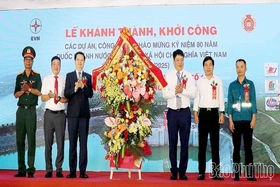
baophutho.vn On August 19, at the construction site of the Hoa Binh Hydropower Plant Expansion Project (Hoa Binh Ward, Phu Tho Province), the inauguration...
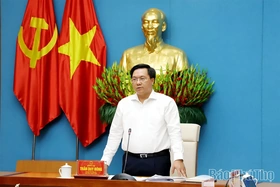
baophutho.vn On the afternoon of August 15, under the chairmanship of Mr. Tran Duy Dong – Deputy Secretary of the Provincial Party Committee and Chairman of...
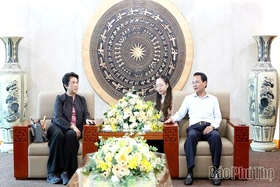
baophutho.vn On the afternoon of August 14, Mr. Dang Xuan Phong, Secretary of the Phu Tho Provincial Party Committee, hosted a courtesy meeting with Ms....
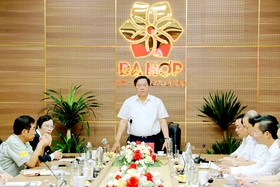
baophutho.vn On August 12, Mr. Tran Duy Dong – Deputy Secretary of the Provincial Party Committee and Chairman of the Provincial People's Committee –...
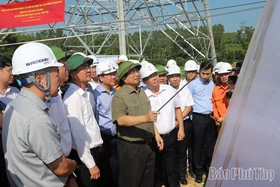
baophutho.vn On the morning of August 9, a working delegation led by Comrade Pham Minh Chinh, Politburo Member and Prime Minister, visited and worked in Phu...
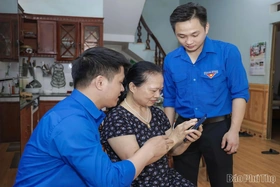
baophutho.vn Phu Tho Province has consistently prioritized the identification, development, and replication of exemplary models in studying and following...
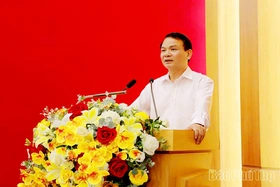
baophutho.vn On the afternoon of August 8, the Provincial Party Executive Committee held its second conference of the 2020–2025 term to implement personnel...
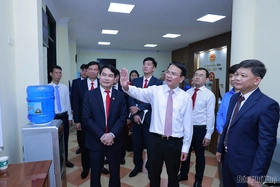
baophutho.vn After one month of implementing the two-tier local government model, thanks to careful, scientific, and well-coordinated preparation—and a...
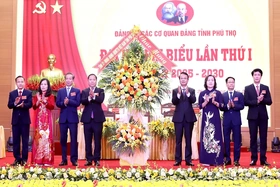
baophutho.vn As of July 31, the last grassroots-level Party organizations in Phu Tho had successfully held their congresses for the 2025–2030 term, making...